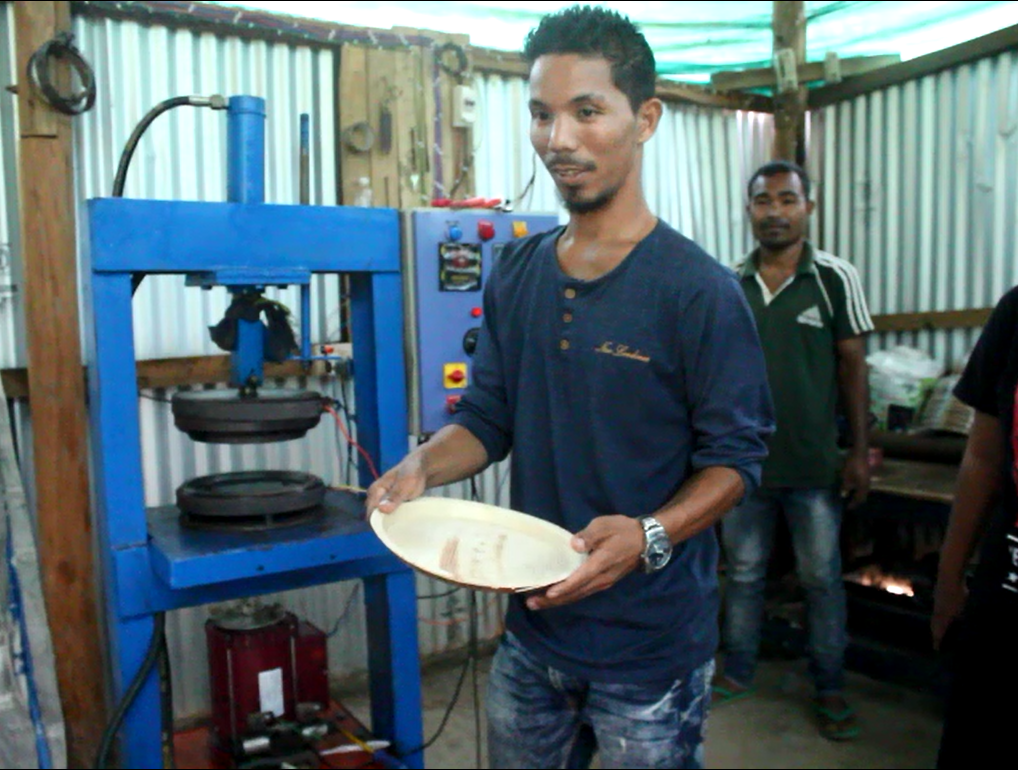
Areca Nut holds an important place among the commercial crops of Meghalaya with the state being placed at the 5th position in the production of Areca nuts, producing 3.3% of total production in India. Areca nut is grown in East Khasi hills, Jaintia hills, West Garo hills and East Garo hills regions of the state. It is consumed in fresh, cured and dry forms along with betel leaves and lime.
While the commercial value of the plant mostly lies in areca nuts, the sturdy sheaths attached to the leaves is usually discarded and not put into good use. However, an entrepreneur from East Garo Hills has made quite a name for himself by using this crop to produce disposable plates and bowls using its leaves that are biodegradable.
A graduate in Science, Dilseng M. Sangma from Williamnagar’s Warimagre, East Garo Hills District was concerned about the use of thermocol plates, bowls and cups as container for food consumption and its harmful effects on human health as well as the larger negative consequences on the environment. Moreover, he also observed that in Garo Hills, the leaves of areca plants lie unutilized all around the place. This made him introspect and he finally decided that it was high time to make good use of areca nut leaves while also minimizing the wastes from non-degradable wastes.
30-yr-old Dilseng M. Sangma learnt about the process of plate making from areca nut leaves through YouTube channels before setting up his small scale industry at Wa·ja Do·rengsaram in East Garo Hill under Rongjeng Block. He started his enterprise in May 2018. He got his first plate making machine from Chennai at INR 3, 36,000.
The raw materials for areca plates are usually collected from East Garo Hills as well as from parts of North Garo Hills. In order to extend the benefits of his initiative to his local community and to boost the collection of raw materials, Dilseng Sangma offers a price of Rs. 1 to adults as well as children who collect areca nut leaves from their respective farms and bring it to his enterprise.
ARECA PLATE MAKING PROCESS
The fallen dry sheaths of areca nut plants are collected and cleaned thoroughly in water with brush to remove the dirt and dust. The process is 100% free from chemicals. The cleaning helps the areca nut sheaths to absorb water which in turn imparts flexibility to the sheaths to ensure easy pressing by the machine in the desired shape. After completion of the cleaning process, the sheaths are dried under the sun as the humidity of the region makes them prone to fungus and moulds.
Following the cleaning and the drying process, the sheaths are ready for pressing by the machine. The dried sheaths are then laid in the machine where they are heat-pressed and cut into the shape of plates and bowls of various sizes.
Moisture content of above 5 per cent needs to be maintained during pressing so as to avoid the appearance of cracks in the product. Currently, he is able to produce a minimum of 200 pieces of plates and bowls per day.
COST OF THE PRODUCT
The areca plate is sold at Rs. 5 per piece. 50 pieces of medium areca bowls are sold at the cost of Rs. 80; 50 pieces of small areca bowls are sold at the cost of Rs. 30. He also produces bowls using Sal leaves which is sold at a comparatively cheaper price than the areca bowls.
He sells his products at Williamnagar, Tura and also in Shillong, especially during special events and casual as well as official social gatherings.
Currently there are two workers involved in the entire process employed at the cost of INR 6000 per month. He earns annual revenue of INR 4-5 lakhs.
His initiative caught the attention of the District Commerce & industry Centers (DCIC) of East Garo Hills District who then forwarded their approval to grant loan to him.
CHALLENGES FACED
Dilseng Sangma’s enterprise is currently operating with just a single machine and although he wishes to expand his business, he faces financial constraint to purchase more machines. The supply of electricity is also not regular and keeps fluctuating causing a hindrance to the production process. The unavailability of machine parts within the state is another obstacle as it takes weeks to replace a machine part in case it gets damaged.
THE WAY AHEAD
Despite facing these challenges, Dilseng plans to expand his business and aims to purchase more machines while aiming to set up his industry in Williamnagar as well as in Tura. He is also planning to bring his industry under the banner name of MS Dils.
Dilseng believes that instead of looking for Government jobs, the young generation should give wings to their ideas and start their own business in order to overcome the problem of unemployment. He knows that business is a risky venture and attaining financial independence through determination and hard work will help to impart confidence in youth.
He also holds the position of being among Meghalaya’s Top 100 Entrepreneurs under Chief Minister’s E-Champion Challenge, a one-of-a-kind programme launched for the first time in Meghalaya on August 14, 2019 with an aim to create an ecosystem where people with workable ideas can walk into an incubator and get all the handholding support needed to navigate the complex web of market, technology and credit.